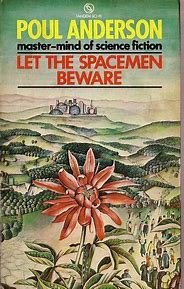I think that Raven deserves to survive and I would like to read a sequel in which he does but one in which he also learns from the experience, emerging as a new Raven, a figurative death and rebirth.
Saturday, 18 November 2023
Outcomes
A fictional narrative can end by implying, instead of explicitly stating, a subsequent course of events. Thus, Poul Anderson's "The Night Face" ends by implying that Raven will not get out of the Holy City alive. In the absence of any sequel recounting any alternative outcome, we must assume that this is the case, that the homicidal Gwydiona kill Raven. An author always has the option of writing a sequel that contradicts the implied outcome of the previous narrative although he has to do it right. Thus, at the end of Isaac Asimov's I, Robot, the Machines, giant positronic brains, control the Terrestrial ecology and economy in what they, and no one else, judges is the best interests of mankind. No one knows what they will do. They sabotage any opposition to their schemes. But, in the sequel, they have judged that self-determination is the highest human good so they have phased themselves out! (In robotics at least, Asimov was a master of dialectical thinking although Anderson was not far behind with the unemployed robot in his Psychotechnic History.)
Subscribe to:
Post Comments (Atom)

2 comments:
Except to make the point Anderson is making kind of requires the sacrifice. Otherwise, in a thud and blunder story, the Lochlanna Mobile Infantry would have simply blasted the Gwydiona and been done with it.
Plenty of SF writers would have been happy with that plot. More than a few readers, as well. ;)
Kaor, Paul!
While I too regret how it is more than likely Raven was killed by Gwydiona who were insane during Baletime, that was how Anderson chose to end THE NIGHT FACE. And he is to be commended from not shying away from the tragedy and evil to be found in live, as indicated by a fair number of his stories. Such as "Murphy's Hall" or "Eutopia."
So I agree with Dave's comments.
Ad astra! Sean
Post a Comment